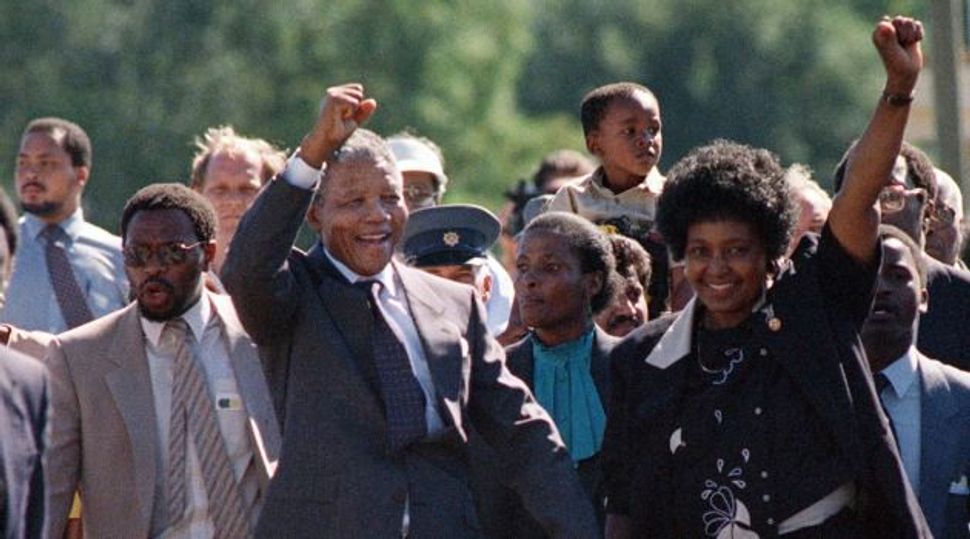Dana Evan Kaplan
By Dana Evan Kaplan
-

Opinion Should Rabbis Marry Outside the Faith?
A rabbinical student at Hebrew Union College, the Reform movement’s central rabbinical school, set off a revealing internal spat when he wrote an op-ed questioning the school’s policy on rabbis and intermarriage. Officially no student at the school is allowed to date or marry a non-Jewish partner. The debate illuminated the Reform movement’s tricky balance:…
-

Opinion The 2 Sides of Nelson Mandela
Nelson Mandela, who died December 5, has come to symbolize the triumph of hope over despair, of love over hatred, and of goodness over evil. I have recently written what an inspiration he has been to me personally as a rabbi who led a congregation in South Africa in the immediate post-apartheid period. I wrote…
-

Opinion Reform Jewry Grapples With Intermarriage Among Rabbinic Students
There’s a new controversy roiling the Reform movement: Can an applicant to rabbinic school be married to a non-Jewish partner? Everyone knows that many American Jews date men and women from other religious backgrounds. But rabbis? This might shock some readers — even today, when nothing shocks us anymore. But actually, the phenomenon is not…
-

Opinion Losing Mark Zuckerberg
The disastrous recent Facebook IPO may have deepened investor distrust of stocks. Hilary Kramer, a stock analyst, told me, “The investors thought they’d be able to make a quick round-trip like in the Internet days, when stocks would rise 100% within seconds of commencing trading.” While I sympathize with their plight, my concern lies elsewhere….
-
Opinion Reform’s Distracting War Over Politics
The nomination of Rabbi Rick Jacobs as president of the Union for Reform Judaism has unintentionally started what could become a divisive and even destructive internal conflict within the Reform movement. Rabbi Jacobs’s association with what are perceived to be left-wing organizations have Reform Jews with conservative or even moderate political views on Israel fearing…
-
Opinion In Praise of Reform Theology
Last month, I published an opinion article in these pages arguing that Reform Judaism’s theology contributes to the sociological factors that are weakening the Reform movement in our open, pluralistic society. In my February 25 article, “The Theological Roots of Reform Judaism’s Woes,” I wrote that contemporary Reform Judaism’s pluralistic theologies and focus on individual…
-
Opinion The Theological Roots of Reform Judaism’s Woes
For a brief moment, no longer than a decade, we Reform Jews have enjoyed repeating that we had become the largest American Jewish denomination. We reveled in the bad news emerging from the Conservative movement, as the children of many longtime members of Conservative synagogues joined Reform congregations, frequently after intermarrying. But today our triumphalism…
Most Popular
- 1

News No Jews allowed: White supremacists are building a segregated community in Arkansas, but is it legal?
- 2

News Zohran Mamdani has represented Astoria’s Jews for 4 years. What do they think of him?
- 3

News Curtis Sliwa has a plan to beat Zohran Mamdani in NYC mayor’s race — and it starts with apologizing to Jews
- 4

Culture Barbra Streisand’s brand-new duet with Bob Dylan is a whole lot different than you might think
In Case You Missed It
-

Yiddish דאָקטוירים פֿון אַן אַנדער שניטDoctors of a different sort
די ווילנער דאָקטוירים יעקבֿ וויגאָדסקי און צמח שאַבאַד זענען אויך געווען געזעלשאַפֿטלעכע טוער.
-

Yiddish ווידעאָ: ווען ייִדיש האָט געקלונגען אין די גאַסן פֿון מעקסיקע VIDEO: When Yiddish rang throughout the streets of Mexico
יעקבֿ פֿינקלמאַן באַשרײַבט אויך זײַן לאַנגיאָריקן פֿאַך — ווי ער האָט צוגעשטעלט וויסן אין טעלעקאָמוניקאַציע איבער דער וועלט
-

Opinion Want to understand what’s wrong with the ‘pro-Palestine’ movement? This Palestinian can help
-

Fast Forward Boulder firebombing suspect’s family can be deported, court says
-
Shop the Forward Store
100% of profits support our journalism







